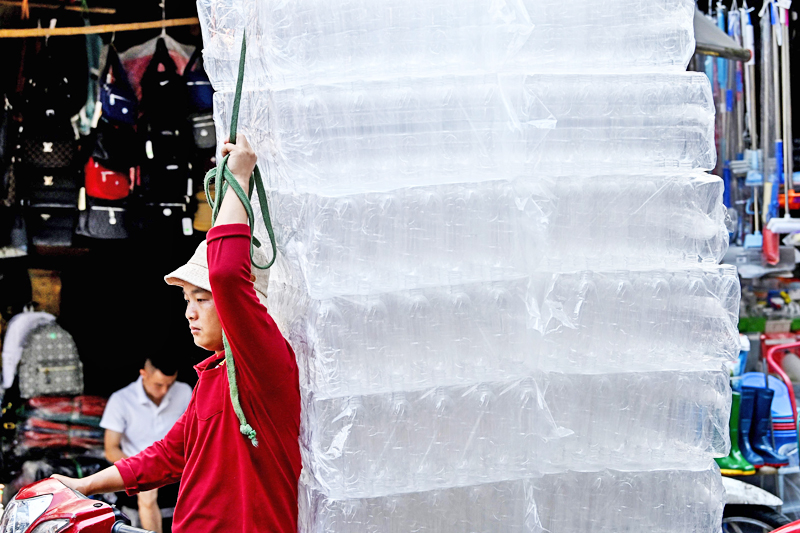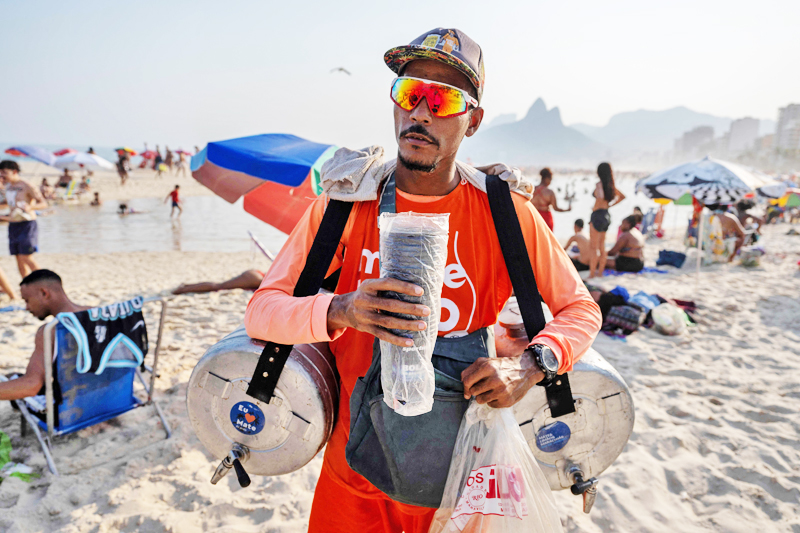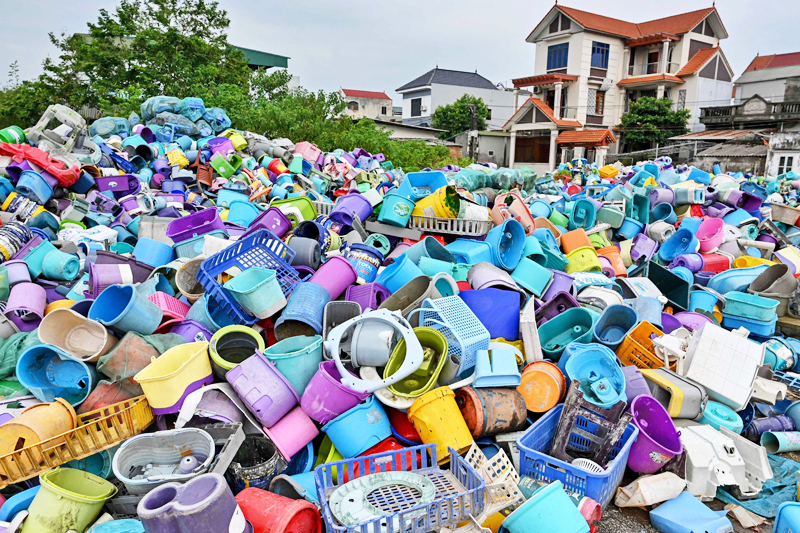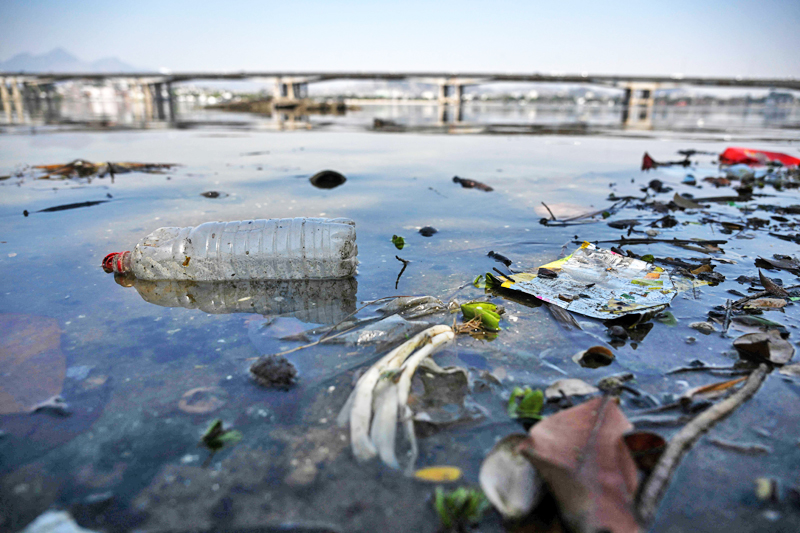BANGKOK – Every year the world produces about 400 million tons of plastic waste, most of which is thrown away just minutes after use. Negotiators hope to reach the world’s first agreement on plastic pollution this year, but in five different countries, an AFP survey found single-use plastics remain popular as a cheap and convenient option, illustrating the challenges ahead.
BANGKOK
On the streets of Bangkok lined with food vendors, customers line up for Maliwan’s famous traditional sweets. Green steamed layer cakes with pandan leaves or blue with telang flowers are placed in a clear plastic bag along with a row of taro pudding in a plastic box.
Every day, the 40-year-old business uses at least two kilos of single-use plastic. “Plastic is easy, readily available and cheap,” said 44-year-old owner Watchararas Tamrongpattarakit.
Banana leaves used to be used regularly, but are becoming more expensive and difficult to obtain. It is also difficult to use because each one must be cleaned and checked for signs of wear. It’s ‘not practical for our sales rate’, says Watchararas.
Thailand began limiting the use of single-use plastic before the pandemic, asking major retailers to stop giving away free bags. But the policy has been largely ineffective, largely ignored by the country’s street food vendors.





Thailand produces two million tonnes of plastic waste a year, according to the country’s Pollution Control Department.
Watchararas tries to combine all purchases in one bag and says some customers bring their own containers and reusable bags.
But Radeerut Sakulpongpaisal, Maliwan’s customer for 30 years, said he found plastic to be ‘pleasant.’
LAGOS
At Obalende market in the heart of Nigeria’s economic capital Lagos, empty water bags litter the ground. Every day, Lisebeth Ajayi sees dozens of customers using their teeth to tear open a bag of ‘pure water’ and drink it.
“They don’t have money to buy bottled water, so they drink pure water,” said the 58-year-old, who sells bottled and bagged water, soap and sponges.
Two 500 milliliter packets sell for between 50 and 250 naira, compared to 250-300 naira for a 750 ml bottle.
Since it appeared in the 1990s, water bags have become a major polluter in most parts of Africa, but they remain popular for drinking, cooking and even washing.
About 200 firms manufacture bags in Lagos, and several hundred more recycle plastic, but supply far exceeds capacity in a country with few public trash cans and a lack of environmental education.
Lagos banned single-use plastics in January, however it hasn’t had much of an impact so far. The United Nations estimates that up to 60 million water bags are thrown away across Nigeria every day.
RIO
Every day, vendors walk the sands of some of Rio de Janeiro’s most beautiful beaches, carrying metal containers filled with ‘mate’, a tea-like drink.
The icy drink, which is mixed with fruit juice, is put in plastic cups for visitors along the beach.
“Drinking mate is part of the culture of Rio de Janeiro,” explains Arthur Jorge da Silva, 47, as he looks for customers.
He acknowledged the impact of his plastic cups on the environment, in a country that was ranked the fourth largest producer of plastic waste in 2019. But ‘it is difficult’ to find cheap alternatives, he told AFP.
The tanned salesman said mate sellers on the beach had been using plastic for as long as he could remember. He pays one dollar for 20 cup units and charges customers US$1.80 for each drink.
Trash cans along Rio’s beaches receive about 130 tons of waste a day, but plastic is not separated, and only 3 percent of Brazil’s waste is recycled each year.
Evelyn Talavera, 24, said she did her best to clean up after leaving the beach. “We need to take care of our planet, throw away trash, keep the environment clean.”
Plastic straws have been banned in Rio restaurants and bars since 2018, and shops are no longer required to offer free plastic bags even though many still do. Congress is also considering legislation that would ban all single-use plastics.
PARIS
In France, single-use plastics have been banned since 2016, but while items like plastic straws and cutlery have disappeared, plastic bags remain commonplace. At Paris’s Aligre market, stalls are filled with fruit, vegetables and stacks of bags ready to be distributed.
Most are labeled ‘reusable and 100 percent recyclable,’ and some are described as compostable or made from natural materials. But experts doubt this claim.
The seller, Laurent Benacer gets a box of 2,000 bags for 24 euros every week. “In Paris, everyone asks for a bag,” he told AFP.
“I stopped, but my neighbor continued, so I had to start again.
There are alternatives such as paper bags, but some customers are not convinced.”
DUBAI
At the Allo Beirut restaurant in Dubai, plastic containers are piled high, waiting to be filled and shipped across the city. “We receive more than 1,200 orders a day,” said delivery manager Mohammed Chanane.
“We use plastic boxes because they are more airtight, and better preserve food,” he said.
With few pedestrians and a hot climate, many of Dubai’s 3.7 million residents rely on delivery for everything from petrol to coffee.
The population of the United Arab Emirates has one of the highest amounts of waste per capita in the world and single-use plastics account for 40 percent of all plastics used in the country. Since June, single-use plastic bags and some similar items have been banned. Polystyrene containers will follow next year. – AFP

